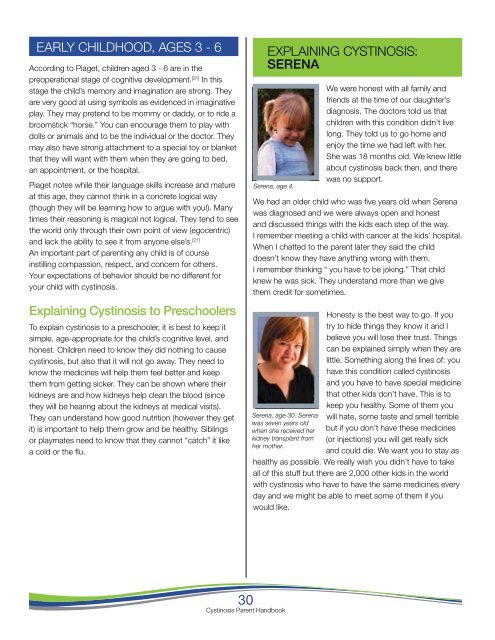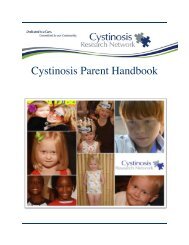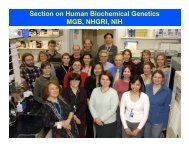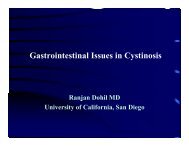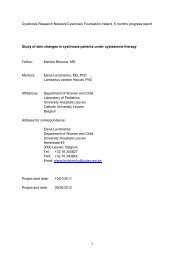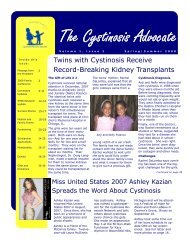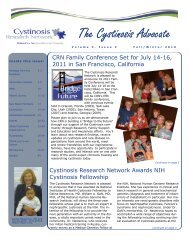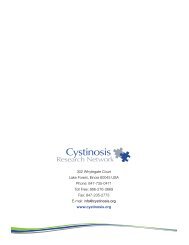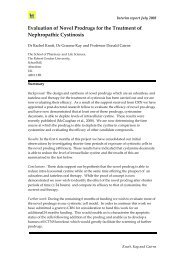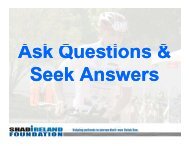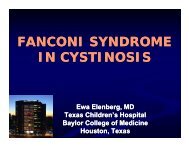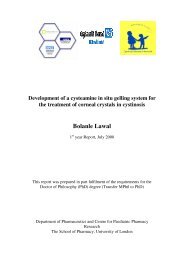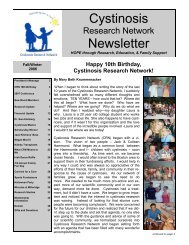Early Childhood, Ages 3 - 6According to Piaget, children aged 3 - 6 are in thepreoperational stage of cognitive development. [21] In thisstage the child’s memory and imagination are strong. Theyare very good at using symbols as evidenced in imaginativeplay. They may pretend to be mommy or daddy, or to ride abroomstick “horse.” You can encourage them to play withdolls or animals and to be the individual or the doctor. Theymay also have strong attachment to a special toy or blanketthat they will want with them when they are going to bed,an appointment, or the hospital.Piaget notes while their language skills increase and matureat this age, they cannot think in a concrete logical way(though they will be learning how to argue with you!). Manytimes their reasoning is magical not logical. They tend to seethe world only through their own point of view (egocentric)and lack the ability to see it from anyone else’s. [21]An important part of parenting any child is of courseinstilling compassion, respect, and concern for others.Your expectations of behavior should be no different foryour child with cystinosis.Explaining <strong>Cystinosis</strong> to PreschoolersTo explain cystinosis to a preschooler, it is best to keep itsimple, age-appropriate for the child’s cognitive level, andhonest. Children need to know they did nothing to causecystinosis, but also that it will not go away. They need toknow the medicines will help them feel better and keepthem from getting sicker. They can be shown where theirkidneys are and how kidneys help clean the blood (sincethey will be hearing about the kidneys at medical visits).They can understand how good nutrition (however they getit) is important to help them grow and be healthy. Siblingsor playmates need to know that they cannot “catch” it likea cold or the flu.Explaining <strong>Cystinosis</strong>:SERENAWe were honest with all family andfriends at the time of our daughter’sdiagnosis. The doctors told us thatchildren with this condition didn’t livelong. They told us to go home andenjoy the time we had left with her.She was 18 months old. We knew littleabout cystinosis back then, and thereSerena, age 4.was no support.We had an older child who was five years old when Serenawas diagnosed and we were always open and honestand discussed things with the kids each step of the way.I remember meeting a child with cancer at the kids’ hospital.When I chatted to the parent later they said the childdoesn’t know they have anything wrong with them.I remember thinking “ you have to be joking.” That childknew he was sick. They understand more than we givethem credit for sometimes.Serena, age 30. Serenawas seven years oldwhen she received herkidney transplant fromher mother.Honesty is the best way to go. If youtry to hide things they know it and Ibelieve you will lose their trust. Thingscan be explained simply when they arelittle. Something along the lines of: youhave this condition called cystinosisand you have to have special medicinethat other kids don’t have. This is tokeep you healthy. Some of them youwill hate, some taste and smell terriblebut if you don’t have these medicines(or injections) you will get really sickand could die. We want you to stay ashealthy as possible. We really wish you didn’t have to takeall of this stuff but there are 2,000 other kids in the worldwith cystinosis who have to have the same medicines everyday and we might be able to meet some of them if youwould like.30<strong>Cystinosis</strong> <strong>Parent</strong> <strong>Handbook</strong>
Medications, Nutrition, and G-tubesThe medications a child with cystinosis will need are manyand may change over time. Oral cysteamine, manufacturedas the drug Cystagon ® , however, is one that will not changeover time. Both pre and post-transplant, this drug is the keyto help remove cystine from the cells of the body and slowthe progression of the disease. Other medications will beused to replace electrolytes lost by the kidney as a result ofFanconi’s syndrome or to treat anemia or bone disease asthe kidney function decreases. [6] Most medications comein liquid form or can be dissolved easily to make it easier toadminister to the young child. As the child grows and learnsto swallow pills, taking medications becomes easier.The use of a G-tube in a child with cystinosis is a questionmany parents may face. It is one that requires carefulconsideration with input from the parents and doctors todetermine what best meets the needs of the individual child.Poor nutritional intake, failure to thrive, frequent vomiting,electrolyte imbalances, large urine output, and insatiablethirst are hallmarks of cystinosis in the first few years. Afterdiagnosis many vile tasting medications are added to thedaily routine. For many parents getting enough food andmedicine into their children with cystinosis to promotegrowth and manage the disease symptoms becomes amonumental struggle. At this time the use of a G-tube maybe considered.A G-tube or gastrostomy tube is a tube placed into asurgical opening (gastrostomy) through the abdominalwall directly into the stomach under a general anesthetic.Through it, liquid medications, and nutritional supplementssuch as Pediasure or Suplena can be delivered directly intothe stomach without the child needing to swallow. This isdone through a bolus-feeding syringe or a special pumpthat can deliver a specified amount of fluid every hour.Advantages: Administering medications is much easierif the child refuses to take them by mouth. Caloricand nutritional intake can be increased with nutritionalsupplements to improve growth and nutrition.Disadvantages: Inserting a G-tube is a surgical procedurethat requires general anesthesia. The size of the tube willneed to be changed as the child grows. As with any surgerythere is a risk of infection. Care must be taken not tobecome G-tube dependent for all nutritional intake.A G-tube should not replace oral nutrition in the childwith cystinosis. Supplements given through the tube arejust that - supplements to provide adequate nutrition andcalories to support health and growth until the child canorally consume enough on his own. The child should beencouraged to eat every day, and to participate in mealtimes with family whenever possible. As the medicationsand supplements regulate electrolyte imbalances, usuallythe appetite improves.The decision to use a G-tube should be based on theanswer to this question. Will using a G-tube improve the[22], [23]quality of the child’s life?Hydration and Toileting IssuesDehydration for a young child with cystinosis is a constantconcern. Cystine accumulation damages the kidneysability to reabsorb water and various electrolytes causinglarge amounts of both to be lost in the urine. This is calledFanconi’s syndrome. <strong>Cystinosis</strong> is the leading cause ofFanconi’s syndrome in children. [6]A child with cystinosis always needs access to fluids.A water source should be available at all times in all places,including home, daycare, preschool, in the car whiletraveling, church, doctors offices etc. Family, caregivers,and teachers must understand that fluids must never berestricted in a child with cystinosis.Since these children also vomit frequently, this can also bea dehydration concern. Children with cystinosis may requirehospitalization for IV rehydration more frequently than anormal child.Signs of Dehydration:[24], [25]• Dry skin, tongue and lips• Reduced or no tears, eyes that appear sunken in• Fatigue, mood changes (fussiness or irritability)• Poor skin turgor• Rapid heart rate and low blood pressureNote: The most common signs of dehydration (thirst andlow urine output) are NOT reliable indicators in childrenwith cystinosis.31<strong>Cystinosis</strong> <strong>Parent</strong> <strong>Handbook</strong>


